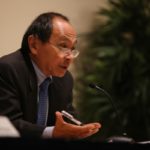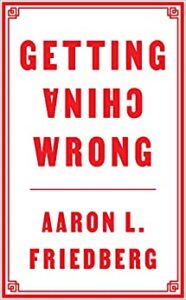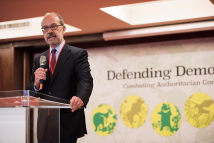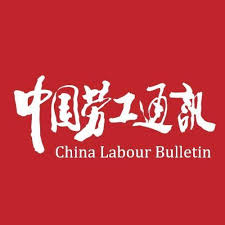Human rights groups have called for Tesla to change course after the company opened a new dealership in the Xinjiang region of China. Reports out of the province have revealed forced labor, mass detention in internment camps and forced sterilizations against Muslim-minority Uyghurs. China is increasingly flexing its economic muscle to silence critics of its campaign, DW NEWS reports (above):
Chipmaker Intel had to apologize after a backlash over a letter to suppliers urging them not to source products or labor from Xinjiang Retail giants Nike and H&M also faced blow-back last year following statements about forced labor in cotton production China is Tesla’s second biggest market after the US, and the company has worked to foster a close relationship.
The regime’s crackdown on business now threatens the growth and innovation needed to take China to the next stage of economic development, analyst Jingzhou Tao writes for The FT.
 The global rollback of democracy has been led by two rising authoritarian countries, Russia and China. Both powers have irredentist claims on other people’s territory, Stanford University’s Francis Fukuyama (left) writes for The New York Times. President Xi of China has asserted that Taiwan must eventually return to China, and Chinese leaders have not excluded the use of military force, if necessary.
The global rollback of democracy has been led by two rising authoritarian countries, Russia and China. Both powers have irredentist claims on other people’s territory, Stanford University’s Francis Fukuyama (left) writes for The New York Times. President Xi of China has asserted that Taiwan must eventually return to China, and Chinese leaders have not excluded the use of military force, if necessary.
A United States “divided, internally preoccupied, and contradicting its own democratic ideals” is a “huge gift” to authoritarians such as Xi and Russian President Vladimir Putin, he wrote in Foreign Affairs.
Autocracies have often tried to brand themselves as democracies – see, for instance, the Democratic People’s Republic of Korea (North Korea) or the German Democratic Republic (East Germany) – but there is an audience for Beijing’s claims, Katie Stallard writes for The New Statesman.

National Endowment for Democracy (NED)
“While these views may not hold much ground in developed, advanced democracies like the US, many countries likely welcome China’s alternative interpretations,” said Bonny Lin, director of the China Power project at the Center for Strategic and International Studies. “Given the growing number of countries that do not meet Western definitions of liberal democracy, these countries may be receptive to Chinese efforts to reinterpret what counts as democratic or acceptable forms of governance.”
But the CCP’s response to tennis star Peng Shuai’s allegations of sexual assault have exposed a growing tension between the CCP’s ambitions to achieve international prestige and the instinct to flatten any perceived threats to its power, Stallard adds.
“China’s leaders clearly care about the country’s global image,” said Ryan Hass, a senior fellow at the Brookings Institution who served as China director on the US National Security Council during the Obama administration. “The rub is that they care more about tightening control at home.”
Suggestions that China and the advanced industrial democracies might somehow be able to put aside their differences and join together to build a new global order based on a shared “recognition of a principle of sustainability” appear fanciful, at best, argues Aaron L. Friedberg, professor of politics and international affairs at Princeton University, and author of the forthcoming book, Getting China Wrong.
 The widespread belief that globalization, would generate ever-closer economic integration and, in turn, encourage the spread of liberal democratic norms and institutions was based on several questionable assumptions. Instead of succumbing gradually to the irresistible charms of liberal democratic capitalism, the Chinese Communist Party held fast to its determination to maintain a monopoly on domestic political power and, toward this end, to retain ultimate control over the nation’s economy, he writes for the Texas National Security Review:
The widespread belief that globalization, would generate ever-closer economic integration and, in turn, encourage the spread of liberal democratic norms and institutions was based on several questionable assumptions. Instead of succumbing gradually to the irresistible charms of liberal democratic capitalism, the Chinese Communist Party held fast to its determination to maintain a monopoly on domestic political power and, toward this end, to retain ultimate control over the nation’s economy, he writes for the Texas National Security Review:
Concerns about the potentially harmful impact of China’s economic policies, its repressive political system, and its increasingly aggressive external behavior are also causing a reexamination of existing ties in other advanced industrial democracies, both in Europe and Asia…. Capitalism might now be “alone,” as economist Branko Milanovic puts it. But, as he also points out, there were now two distinctly different forms of capitalism:
- The older and still dominant “liberal meritocratic” variant had “developed incrementally in the West over … two hundred years” and combined market-centered economics with democratic politics.
- The second, newer form of “state-led political, or authoritarian, capitalism,” exemplified by China, began to come fully into its own only after the end of the Cold War.
Value-Based Blocs (Globalization 2.5)

Source: Taiwan Foundation for Democracy
An alternative future would be a world in which the advanced industrial democracies of Europe, Asia, and the Western Hemisphere band together to form a free trade area and perhaps a full economic bloc, adds Friedberg (right). They might be joined in all or part of this endeavor by a few countries that are democratic but less developed (like India), and possibly by a handful of others that are neither democratic nor highly developed (like Vietnam) or highly developed but not democratic (like Singapore). A new trading bloc organized along these lines would have a number of economic and strategic benefits for the United States and its partners, he suggests:
- Assuming that they can synchronize their negotiating positions, the members of a democratic trading bloc could work together to exert leverage over Beijing, threatening to deny or restrict its access to their common market if it refuses to modify its mercantilist trade and industrial policies….
- Although a merging of markets would not be necessary to achieve this end, closer integration would also make it easier for the democracies to coordinate their policies on technology transfer, export controls, and the screening of proposed Chinese investments.
- Agreed standards regarding freedom of expression, data privacy, cyber espionage, and other malicious activity could also result in the formation of a “digital version of the Schengen Agreement,” a democratic “digital bloc within which data, services, and products can flow freely.”
 Those who advocate change will have to mobilize a countervailing coalition [to the current consensus], Friedberg concludes, making the case not only that a new system is essential for reasons of national security, but also that the costs of transition will be temporary and manageable, and that they will be offset in the long run by the welfare gains arising from closer integration among the democracies and better defenses against China’s predatory practices. RTWT
Those who advocate change will have to mobilize a countervailing coalition [to the current consensus], Friedberg concludes, making the case not only that a new system is essential for reasons of national security, but also that the costs of transition will be temporary and manageable, and that they will be offset in the long run by the welfare gains arising from closer integration among the democracies and better defenses against China’s predatory practices. RTWT
Western leftist apologists for China’s authoritarian model have it wrong, says analyst Paul Mason, the author of PostCapitalism. By privatizing most of China’s heavy industry and opening the country to Western finance and foreign investment, Deng Xiaoping did not “save world socialism”. Arguably, he saved capitalism, as cheap Chinese imports suppressed Western inflation, while the jobs of millions of well-paid, unionized workers in the West moved to China and their bargaining power collapsed, he writes for The New Statesman:
There is nothing the Western labour movement can do about that. But we can tell the truth about it. We can keep alive the history. We can show solidarity with what is left of the independent migrant workers’ organisations, whose activities I covered as a BBC journalist. And we can show solidarity with those in Hong Kong struggling to maintain the last remnants of democracy.
#China‘s treatment of #PengShuai exposed a growing tension between #CCP’s ambitions to achieve international prestige & the instinct to flatten any perceived threats to its power, @NewStatesman‘s @katiestallard writes. https://t.co/OxeI0fTh9W
— Democracy Digest (@demdigest) January 5, 2022







